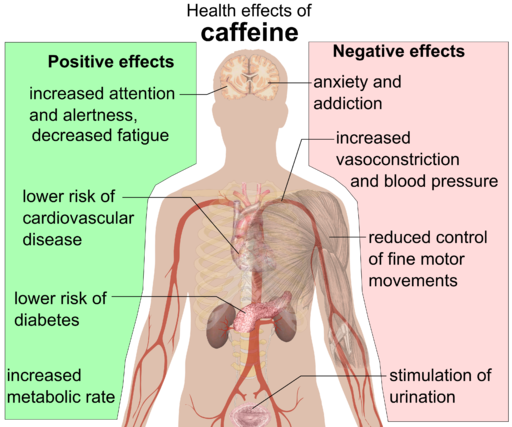Academic Journal
Main Category: Nutrition / Diet
Also Included In: Women's Health / Gynecology;��Endocrinology
Article Date: 29 Jan 2012 - 0:00 PST
![]() email to a friend �
email to a friend � ![]() printer friendly �
printer friendly � ![]() opinions �
opinions �
Current Article Ratings:
| Patient / Public: |  | 3.43 (14 votes) |
| Healthcare Prof: |  | 3.2 (10 votes) |
| Article Opinions: | �2 posts |
Researchers at the National Institute of Health, along with other institutions, have released a study online in the American Journal of Clinical Nutrition, stating that Asian women have higher estrogen levels when drinking 200 milligrams or more of caffeine a day. This is about 2 cups of coffee. On the other hand, white women who drank the same amount tended to have lower estrogen levels than those who did not drink this amount of caffeine. The study goes on to say that African American women who drank equally as much as both the Asian women and the white women also had higher levels of estrogen, but the statistics could not confirm whether this was enough to go by.
Their research came from analyzing women who were drinking either caffeinated soda, coffee, green tea or black tea. Coffee seemed to make the most difference in the estrogen levels of all of the women. Asian women had higher levels of estrogen, white women had lower, and African American women's levels could not be determined. Soda and green tea, however, were shown to produce high estrogen women in Asians, whites, and African Americans.
None of the estrogen levels of the women who were observed changed any of their menstruation patterns, as the researches may have thought. Enrique Schisterman, Ph.D, of the Division of Epidemiology, Statistics and Prevention Research at the Eunice Kennedy Shriver National Institue of Child Health and Human Development (NICHD), NIH Institute said:
The results indicate that caffeine consumption among women of child-bearing age influences estrogen levels. Short term, these variations in estrogen levels among different groups do not appear to have any pronounced effects.
We know that variations in estrogen levels are associated with such disorders as endometriosis, osteoporosis, and endometrial, breast, and ovarian cancers. Because long term caffeine consumption has the potential to influence estrogen levels over a long period of time, it makes sense to take caffeine consumption into account when designing studies to understand these disorders.
The authors revealed that 89% of adult females between 18 and 34 years of age drink, on average, 1.5 cups of coffee each day.
The researchers gathered data on over 250 women aged 18 to 44 years from 2005 through 2007. They drank an average of 90 milligrams of caffeine per day - a little more than the equivalent of a cup of coffee's worth.
The participants came into the clinic from once to three times a week during two of their menstrual cycles. The researchers gathered data on what they had eaten during the previous 24 hours, as well as details on their sleeping hours, smoking, exercise and other lifestyle patterns. Their estrogen levels were also measured.
In an Abstract in the journal, the authors concluded:
"Moderate consumption of caffeine was associated with reduced estradiol concentrations among white women, whereas caffeinated soda and green tea intakes were associated with increased estradiol concentrations among all races. Further research is warranted on the association between caffeine and caffeinated beverages and reproductive hormones and whether these relations differ by race."
Other known effects of caffeine
The illustration below shows some of the known positive and negative health and mental effects of caffeine consumption.Written by Christine Kearney
Copyright: Medical News Today
Not to be reproduced without permission of Medical News Today
Karen C Schliep, Enrique F Schisterman, Sunni L Mumford, Anna Z Pollack, Cuilin Zhang, Aijun Ye, Joseph B Stanford, Ahmad O Hammoud, Christina A Porucznik, and Jean Wactawski-Wende
Am J Clin Nutr February 2012 vol. 95 no. 2 488-497.
MLA
Christine Kearney. "Caffeine Alters Estrogen Levels." Medical News Today. MediLexicon, Intl., 29 Jan. 2012. Web.
30 Jan. 2012. <http://www.medicalnewstoday.com/articles/240894.php>
APA
Please note: If no author information is provided, the source is cited instead.
| Rate this article: (Hover over the stars then click to rate) | Patient / Public: | or | Health Professional: |
Added benefit of caffeine
posted by Barbara on 28 Jan 2012 at 8:38 pmI have heard, and I believe from experience, that caffeine also reduces muscle pain after working out at gym as well as increasing energy to work out longer.
old news
posted by John on 29 Jan 2012 at 8:37 pmIt is already documented that caffine increases testosterone levels in athletic men (NIH study). Given the close tie between estrogen and testosterone, I would suggest this is bordering on old news and it's lacking the exercise portion that was included in the NIH study.
This might suggest asian women are more active so the effect registered higher in them?
Please note that we publish your name, but we do not publish your email address. It is only used to let you know when your message is published. We do not use it for any other purpose. Please see our privacy policy for more information.
If you write about specific medications or operations, please do not name health care professionals by name.
All opinions are moderated before being included (to stop spam)
Contact Our News Editors
For any corrections of factual information, or to contact the editors please use our feedback form.![]()
Please send any medical news or health news press releases to:
Note: Any medical information published on this website is not intended as a substitute for informed medical advice and you should not take any action before consulting with a health care professional. For more information, please read our terms and conditions.
Source: http://www.medicalnewstoday.com/articles/240894.php
health checks for women womens health womens health supplement womens health questions

No comments:
Post a Comment